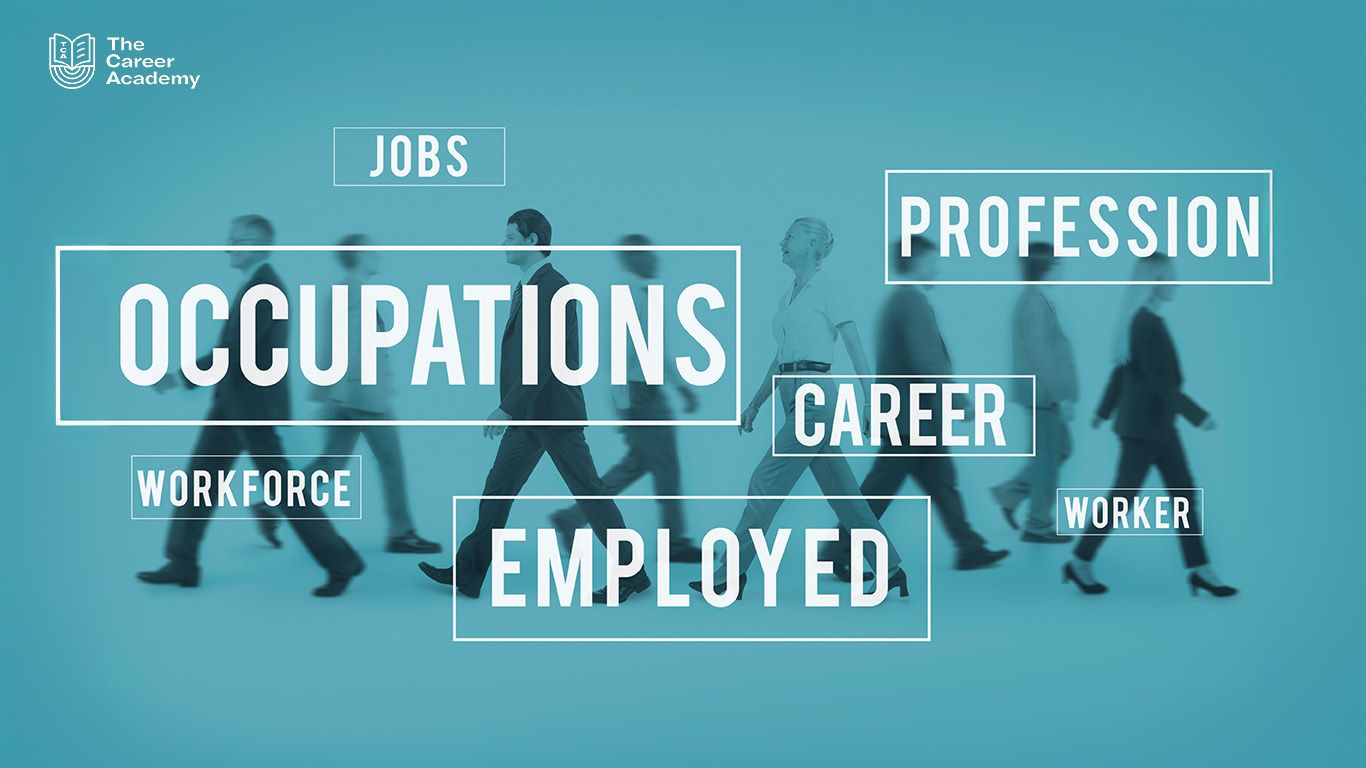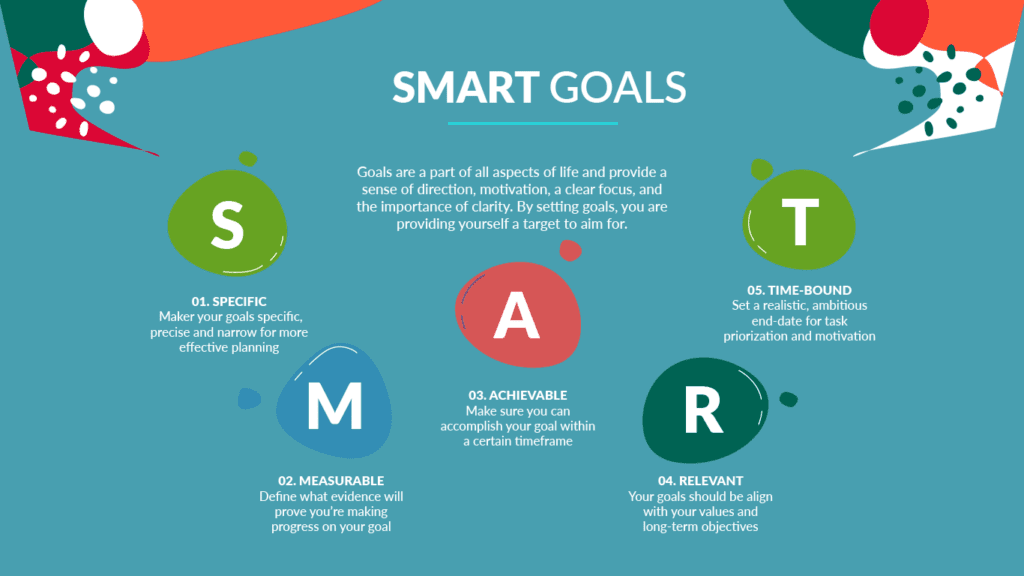
Career development is a strategic and systematic process that involves setting personal goals and utilizing strategies to achieve professional growth. It aligns an individual’s skills, interests, and values with organisational objectives, ensuring a mutually beneficial relationship between employee career progression and organisational success. Career development is significant as it attracts and retains top talent, enhances employee engagement, and drives organisational productivity. It includes components such as self-assessment, goal setting, career exploration, skill development, and action planning.
The SMART Goals Framework is a powerful tool for setting career goals that are clear, focused, and practical. At The Career Academy NZ, we offer a range of courses designed to help you achieve your career aspirations. Let’s break down each component of the SMART framework with detailed explanations and examples tailored to our courses.

Set clear and specific goals. Vague goals are hard to achieve. Instead of saying, “I want to improve my skills,” specify what skills you want to improve.
For example, “I want to enhance my accounting skills by completing the Certificate in Accounting offered by The Career Academy NZ.”
Example: Instead of saying, “I want a better job,” you could say, “I want to become a certified payroll specialist within the next year by completing the Certificate in Payroll Administration from The Career Academy NZ.”
Ensure your goals can be tracked and measured. This will help you stay on track and motivated. Use quantifiable criteria to measure your progress.
Example: If your goal is to increase your business management knowledge, specify how much content you will cover.
“I will complete one module of the Diploma in Business Administration from The Career Academy NZ every two weeks.”
Tools: Consider using tools like Trello or Asana to track your progress. These platforms allow you to create checklists, set deadlines, and visualize your progress, making it easier to stay organized and motivated.
Your goals should be realistic and attainable. Setting impossible goals sets you up for failure and frustration. Evaluate your resources and constraints to ensure your goals are achievable.
Example: If you’re aiming to learn a new software for bookkeeping, start with,
“I will complete the Accounts Administration and Payroll Pathway from The Career Academy NZ over the next three months and practice by managing the books for a small project.”
Worksheets: Printable templates or worksheets can be very useful in breaking down large goals into smaller, more manageable steps. You can find many free SMART goal templates online that guide you through the process.
Set goals that matter to you and align with other relevant goals. Ensure your goals are aligned with your long-term career aspirations and values.
Example: If your long-term goal is to become a certified project manager, a relevant short-term goal might be,
“I will complete the Diploma in Project Management from The Career Academy NZ within the next six months.”
Consistency: Align your goals with your company’s objectives or your personal career growth plans. This relevance keeps you motivated and focused on what truly matters.
Every goal needs a target date to focus on and to work toward. A deadline creates a sense of urgency and helps prioritize tasks.
Example: If you aim to improve your professional qualifications, set a deadline:
“I will pass the Xero certification exam offered by The Career Academy NZ by the end of the year.”
This time-bound goal gives you a clear timeframe to work within.
Tracking: Regularly review your progress towards your deadlines. Set milestones along the way to ensure you’re on track and make adjustments as necessary.
Let’s see a full example of a SMART goal in action:
Goal: “I want to become a certified payroll specialist (Specific) by completing the Certificate in Payroll Administration from The Career Academy NZ (Achievable) within the next 12 months (Time-bound). I will study for 10 hours each week (Measurable) and align this certification with my career objective to advance to a senior payroll officer role (Relevant).“
By following the SMART framework and utilising the courses offered by The Career Academy NZ, you can set clear, actionable goals that lead to meaningful progress in your career. Remember, regularly reviewing and adjusting your goals is crucial to ensure they remain aligned with your evolving aspirations.

New Zealand’s job market in 2024 is dynamic and influenced by several key trends. According to Stats NZ and the Ministry of Business, Innovation, and Employment (MBIE), high-demand industries include technology, healthcare, and trades. Understanding these trends is crucial for job seekers and career developers. Here’s a closer look at how these trends relate to courses offered by The Career Academy NZ:
With businesses continually needing accurate financial records, there’s a high demand for professionals in accounting and bookkeeping. Courses like the AAT Accounting Pathway Program, Certificate in Accounting, and Certificate in Bookkeeping can provide the necessary skills to enter and advance in this field.
Explore more courses in Accounting and Bookkeeping.
The administrative roles are vital across all industries. The Certificate in Business Administration and Diploma in Business Administration can prepare you for these in-demand positions, while courses like Certificate in Accounts Administration & Payroll and Certificate in Personnel Management & Human Resources are highly relevant.
Explore more courses in Business and Administration
The tech sector’s growth creates opportunities for those skilled in software and IT. Courses like the Advanced Certificate in Microsoft Excel, Certificate in Microsoft Essentials, and Diploma in Excel can provide you with valuable tech skills.
Healthcare is another booming sector. Administrative roles in this field are crucial. The Certificate in Medical Reception and Certificate in Medical Terminology are perfect for those looking to enter medical administration. Explore more courses
As tourism rebounds, there’s a growing need for skilled professionals in this industry. The Diploma in Hospitality & Tourism and Certificate in Event Management can prepare you for various roles in this sector.
Explore more courses in Hospitality & Tourism
For those passionate about animal welfare, courses like the Certificate in Animal Care, Diploma in Veterinary Assistant & Animal Welfare, and Dog Grooming Business Pathway provide a pathway to fulfilling careers.
Explore more courses in Animal Care

Networking is crucial for career advancement. Here are some effective strategies:
Participate in conferences, seminars, and workshops related to your field. These events are great opportunities to meet industry professionals, learn about the latest trends, and build valuable connections.
Leverage platforms like LinkedIn to connect with industry professionals. LinkedIn is a powerful tool for networking, job searching, and professional development.
Membership in professional bodies can provide valuable networking opportunities, resources, and support. These organisations often host events, offer certifications, and provide a platform to connect with peers.
Additionally, The Career Academy NZ collaborates with numerous professional organisations to enhance your networking opportunities and provide you with recognised qualifications:
Hearing from professionals who have successfully built their networks can be inspiring and provide practical tips. Reading their stories can offer insights into effective networking strategies and the benefits of a strong professional network.
Your CV and cover letter are often the first impression you make on potential employers. Getting your dream job requires you to stand out. Here’s how to make yours shine, using the resources and tips from The Career Academy NZ.
Customise your CV for each job application to highlight relevant experience and skills. A one-size-fits-all approach won’t cut it in today’s competitive job market.
Utilize online CV builders that offer customisable templates. Websites like Canva and Zety provide sleek, professional designs that can be tailored to specific roles.
Your cover letter should be engaging and demonstrate why you are the ideal candidate for the job. This is your opportunity to showcase your personality and enthusiasm.
Ensure your CV and cover letter are free of typos and errors. Attention to detail reflects your professionalism.

Preparation is key to performing well in job interviews. Let’s explore the steps to ensure you’re ready to impress.
Be aware of the type of interview you will be facing—whether it’s a panel, group, or one-on-one. Knowing this will help you prepare accordingly.
Example: If it’s a panel interview, prepare to address multiple people and manage directing your answers to the appropriate panel member.
Research: Learn about the company and the role. Familiarise yourself with their recent projects and company culture.
Rehearse answers to common interview questions and prepare examples that showcase your skills and experiences.
Example: Review the common interview questions provided by The Career Academy NZ. Practice your responses to questions like, “Can you tell me about a time when you faced a challenging situation and how you dealt with it?”
Technique: Use the STAR method (Situation, Task, Action, Result) to structure your answers.
Send thank-you notes or emails after the interview to leave a positive impression. This simple act of courtesy can set you apart from other candidates.
Example: “Thank you for the opportunity to interview for the marketing coordinator position. I’m very excited about the possibility of contributing to your team and applying my skills in social media strategy and content creation.”
Online job portals are powerful tools in your job search. They provide access to a wide range of job listings and can help streamline the application process.
Example: Utilise platforms like Seek, Indeed, and LinkedIn to find job opportunities. The Career Academy NZ also offers career support services that can help you navigate these portals effectively.
Tips: Set up job alerts to receive notifications about new postings that match your skills and preferences. Tailor your profile on these platforms to highlight your courses and certifications from The Career Academy NZ.
– Seek
– Trade Me Jobs
– LinkedIn
Ensure your online profiles are complete and highlight your skills and experience.
Set up alerts and use filters to find jobs that match your criteria.
Ongoing education is crucial for career advancement and staying competitive in today’s job market. Here’s how you can continuously enhance your skills and maintain a balanced, productive lifestyle.
Enhance your skills and employability with the diverse range of courses and certifications offered by The Career Academy NZ. Whether you’re looking to specialise in accounting, business administration, project management, or another field, our programs are designed to provide you with the practical skills and knowledge needed to excel.
Leverage online learning platforms like Coursera and edX to access free courses on various topics. These platforms offer flexibility, allowing you to learn at your own pace and on your own schedule.
Maintaining a healthy work-life balance is essential for long-term career success. Overworking can lead to burnout, which negatively impacts productivity and overall well-being.
Incorporate self-care practices like meditation, exercise, and hobbies into your routine to manage stress effectively. These activities can improve your mental health and increase your productivity.
Set boundaries and create a dedicated workspace to stay productive while working from home. Following a consistent schedule can help you maintain a work routine and separate your personal life from your professional responsibilities.
Hearing from those who have successfully navigated their careers can be incredibly motivating. Testimonials from graduates of The Career Academy NZ provide insights into effective career development strategies and the impact of continuous learning.
Navigating career development and job search strategies for 2024 in New Zealand requires a clear understanding of the job market, effective goal setting, and leveraging available resources. By utilizing the SMART goals framework, building a professional network, crafting standout CVs and cover letters, and continuously learning, you can position yourself for success. Stay informed about industry trends and maintain a healthy work-life balance to achieve long-term career satisfaction and growth.
By following these strategies and insights, you’ll be well-equipped to advance your career in 2024 and beyond.
For more information and resources, visit The Career Academy to explore courses and certifications that can enhance your career development.
©2024 The Career Academy is Internationally Approved and Registered with the International Approval and Registration Centre. Our courses are recognised by industry and employers throughout New Zealand and Internationally. We are an ICOES accredited centre and all the programs we offer are therefore accredited. The Career Academy is a Xero Partner, an MYOB Approved Education Partner, an IAB Accredited Training Provider and an AAT Approved Training Provider(Provider code: OO01000627). We are a registered service provider with NZTE. The Career Academy Limited is a New Zealand Registered Company (Company Number: 1922762)
FOR